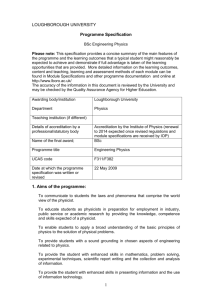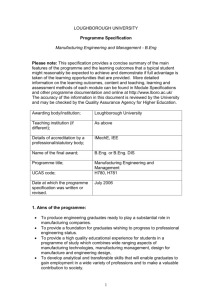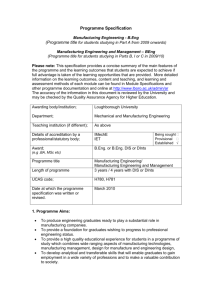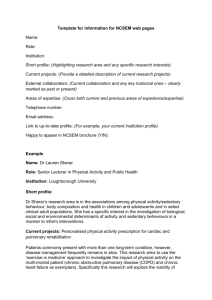2D & 3D Visualisatio.. - Loughborough University
advertisement
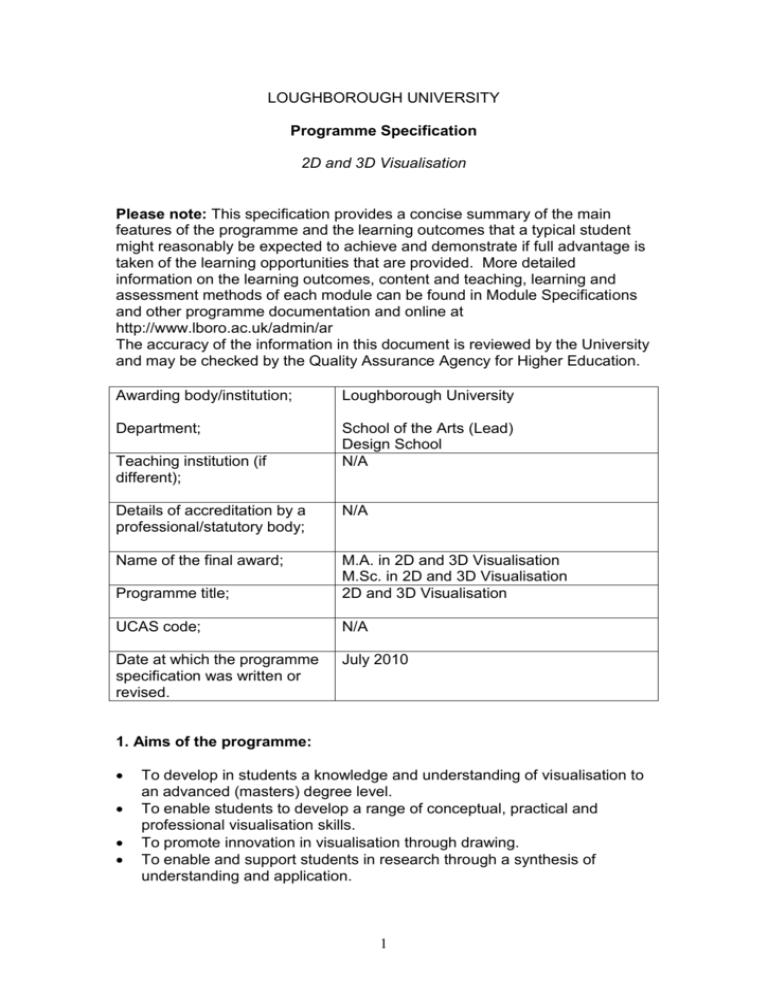
LOUGHBOROUGH UNIVERSITY Programme Specification 2D and 3D Visualisation Please note: This specification provides a concise summary of the main features of the programme and the learning outcomes that a typical student might reasonably be expected to achieve and demonstrate if full advantage is taken of the learning opportunities that are provided. More detailed information on the learning outcomes, content and teaching, learning and assessment methods of each module can be found in Module Specifications and other programme documentation and online at http://www.lboro.ac.uk/admin/ar The accuracy of the information in this document is reviewed by the University and may be checked by the Quality Assurance Agency for Higher Education. Awarding body/institution; Loughborough University Department; School of the Arts (Lead) Design School N/A Teaching institution (if different); Details of accreditation by a professional/statutory body; N/A Name of the final award; Programme title; M.A. in 2D and 3D Visualisation M.Sc. in 2D and 3D Visualisation 2D and 3D Visualisation UCAS code; N/A Date at which the programme specification was written or revised. July 2010 1. Aims of the programme: To develop in students a knowledge and understanding of visualisation to an advanced (masters) degree level. To enable students to develop a range of conceptual, practical and professional visualisation skills. To promote innovation in visualisation through drawing. To enable and support students in research through a synthesis of understanding and application. 1 To enable students to develop key transferable skills in the areas of information technology, problem solving, communication, management, team work and professionalism. To promote an understanding of, and examine the opportunities for, professional practice. 2. Relevant subject benchmark statements and other external and internal reference points used to inform programme outcomes: Loughborough University learning and teaching strategy (http://www.lboro.ac.uk/admin/ar/policy/learning_and_teaching/index.htm). The School of the Arts and Design School learning and teaching policies. The Framework for Higher Education Qualifications Loughborough University academic quality procedures handbook (http://www.lboro.ac.uk/admin/ar/policy/aqp/index.htm). The research interests and specialisms of the teaching staff including the Drawing Research group (http://www.lboro.ac.uk/departments/ac/mainpages/Research/staff%20gro ups/drawing.htm) and Design Practice Research group (http://www.lboro.ac.uk/departments/cd/research/groups/dr_group.html). Loughborough University equal opportunities policy. (http://www.lboro.ac.uk/admin/personnel/harassmentandb/equalopps.htm). National and international exhibitions. Note: that there are currently no subject benchmark statements for masters level Art and Design programmes. 3. Intended Learning Outcomes Please refer to the curriculum map to identify specifically where the intended learning outcomes detailed below are developed and assessed within the programme. 3.1 Knowledge and Understanding: On successful completion of this programme, students should be able to demonstrate knowledge and understanding of: a range of methods within the field of 2D and 3D visualisation. the integration of 2D and 3D representation. the opportunities within visual experimentation and innovation. methods and methodologies applicable to academic and professional needs. a range of contexts – cultural, social and theoretical, and their implications for the student’s practice. a range of subject specific and transferable skills as detailed in section 3.2 below. Teaching, learning and assessment strategies to enable outcomes to be achieved and demonstrated: 2 On commencement of the programme students are provided with a handbook on the departmental infrastructure and procedures, programme and module information and assessment structure. Knowledge and understanding will be acquired from a combination of learning and teaching methods applied to theoretical and practice based work. The students will encounter a variety of teaching styles and elements including lectures, seminars, tutorials (critiques), practical sessions, computer-aided learning and self-guided study (http://www.lboro.ac.uk/library/skills/Advice/LearningatUni-1.pdf). Assessment is 100% coursework including visual and written outcomes and oral presentations in accordance with the Loughborough University coursework code of practice and departmental procedures and protocols (http://www.lboro.ac.uk/admin/ar/student/exams/cop/coursework.htm). Peer review will also be explored as an additional means of assessment. All assessment is accompanied by feedback. Formative feedback both oral and written is provided regularly within each module both informally and at timetabled points. Summative written feedback is provided for all interim and final coursework assignments. 3.2 Skills and other attributes: a. Subject-specific cognitive skills: On successful completion of this programme, students should be able to: convey a broad and comparative awareness of 2D and 3D visualisation. initiate, manage, reflect, critique and evaluate their practice appropriate to specific project briefings and the nature of their enquiry. identify with, respond to, and critically reflect upon the opportunities and dynamics for learning with their peers and other external contexts. develop ideas, concepts, theories, and arguments for different audiences through a range of cognitive methods and methodologies. identify and understand the relationships and contexts of their research into practice, and situate them within a personalised visual language. identify the opportunities for further research. Teaching, learning and assessment strategies to enable outcomes to be achieved and demonstrated: Subject specific cognitive skills are advanced through a combination of learning and teaching methods applied to theoretical and practice 3 based work. Teaching styles, assessment and feedback methods will be consistent with those identified in section 3.1. These teaching styles, assessment and feedback methods will support the students in acquiring the cognitive skills and the application of these skills in an informed, integrated, and critical manner. Examples of key strategies to enable the advancement of cognitive skills are identified as: the use of project based teaching and assessment; the reflective final project report; group working; and the integration of research into practice. b. Subject-specific practical skills: On successful completion of this programme, students should be able to: demonstrate a broad ability with 2D and 3D visualisation techniques. demonstrate an advanced level of ability with appropriate 2D / 3D visualisation techniques in response to a final project proposal. integrate 2D and 3D representations in investigative and creative work. evidence their practice appropriate to specific project briefings and the nature of their enquiry. communicate ideas, concepts, theories, and arguments with different audiences through a range of practical methods and outcomes including visual, tactile, written and oral. demonstrate the relationships and contexts of their research into practice. Teaching, learning and assessment strategies to enable outcomes to be achieved and demonstrated: Subject specific practical skills are advanced through a combination of learning and teaching methods applied to theoretical and practice based work. Teaching styles, assessment and feedback methods will be consistent with those identified in section 3.1. These teaching styles, assessment and feedback methods will facilitate the students in developing the appropriate practical skills and the application of these skills in an experiential, applied, and professional manner. Examples of key strategies to enable the advancement of practical skills are identified as: the use of project based teaching and assessment; practical sessions; self-guided study e.g. ‘playtime’; and production and presentation of the final project. c. Key/transferable skills: On successful completion of this programme, students should be able demonstrate transferable skills in: 4 information technology – including online information resources. problem solving – including clarification of questions, consideration of alternative solutions and evaluation of outcomes. communication – including visual, written and oral presentation and discussions. management – including self learning, and project and time management. teamwork – including shared responsibilities, the agreement of common goals and methods, and co-ordination of resources. professionalism – including acting professionally in accordance with ethical propriety, and the observation of safe working practices. Teaching, learning and assessment strategies to enable outcomes to be achieved and demonstrated: Key / transferable skills are advanced through a combination of learning and teaching methods applied to theoretical and practice based work. Teaching styles, assessment and feedback methods will be consistent with those identified in section 3.1. These teaching styles, assessment and feedback methods will facilitate the students in developing key / transferable skills and the application of these skills in a consistent and flexible manner. Assessment of key skills is embedded in module assessment, and is explicit in module assessment feedback. 4. Programme structures and requirements, levels, modules, credits and awards: Full details can be found in the Programme Regulations at: http://www.lboro.ac.uk/admin/ar/lps/progreg/year/1011/docs/2D%20&%203D %20Visualisation%20MA-MSc.doc Note: The award of an MA or MSc will depend on the methods and methodologies applied to, and the outcomes of, the final project rehearsal module. 5. Criteria for admission to the programme: Full details can be found at http://www.lboro.ac.uk/prospectus/pg/courses/dept/cd/2d3dv/index.htm 6. Information about assessment: All taught modules provided by the School of the Arts and the Design School will be assessed on the basis of 100% coursework in accordance with the Loughborough University coursework code of practice and departmental procedures and protocols 5 (http://www.lboro.ac.uk/admin/ar/student/exams/cop/coursework.htm). Taught modules provided by other departments may be assessed by examination, coursework or a combination of both. For the award of M.A. or M.Sc. candidates must undertake 180 module credits. See University Regulation XXI – Programme Mark and Distinctions for further detail: http://www.lboro.ac.uk/admin/ar/calendar/regulations/current/21/index.htm At least 150 credits of the 180 must be taken from those shown in section 4 above. Candidates for the award of M.A. or M.Sc. must complete the two Final Project modules (DTP703 & SAP103). In accordance with the Regulation XXI, candidates who have the right of reassessment in a module will be offered an opportunity to be re-assessed in a special assessment period. The Final Project module will consist of visual outcomes together with a substantial written contribution in the form of a project report. Assessment details are further specified on the module specifications and collectively are designed to ensure that students develop a range of skills, competencies, knowledge and understanding as outlined under "Intended Learning Outcomes". Please see the full programme regulations for further details. 7. What makes the programme distinctive? The School emphasises opportunities for personal professional development through structured elements of the curriculum . Students are also given opportunities to participate in national and international competitions and to undertake commissions. Students are also encouraged to participate in the governance of the School and engage in marketing and widening participation activities, which give opportunities for personal development. External objective measures include the government’s national QAA External Subject Review score of 23, one of the highest in the country. Student employment rates ranging from 80 to 90% leading to the Daily Telegraph Newspaper describing us as one of the top three places for a creative career in the country. The Guardian Newspaper’s Art School league table placed the School of the Arts top of the mass providers of vocational art and design education. The primary focus of work on School of the Arts programmes can be characterised as ‘thinking through making’ in some of the best specialist workshop facilities available in an HEI. The programme is distinctive by being offered by two departments: The School of the Arts and the Design School. It will incorporate the distinct strengths of the two departments and collaboratively deliver an interdisciplinary curriculum. 6 The learning through experience nature of the two departments provides a flexibility in module content that covers a broad spectrum of approaches to visualisation that would be beyond the scope of any single department. Such approaches reflect departmental teaching and research strengths such as: drawing, animation, education, ergonomics, CAD, and prototyping. This flexibility within the programme is also reflected in the option to award M.A. or M.Sc. as appropriate. 8. Particular support for learning: i) Departmental Support The department has an integrated structure for the management, appraisal and planning of teaching and learning. This is comprised of a Co-ordinator of Teaching and Learning (who manages teaching committee and has overall responsibility for teaching matters), Programme Co-ordinators have responsibility for the academic content and the general organisation of the course, and the academic welfare of the students), Year Co-ordinators monitor students performance and attendance and Personal Tutors who are responsible for matters relating to academic welfare. A tutor to co-ordinate support for international students The Department prepares a handbook for students, which is available via the internet with important information including the management structure of the department, programme and module specifications and general points relating to coursework, assessment and student advice and support. Students are also assigned a personal tutor who is responsible for their personal welfare who arranges to see them regularly during the first semester. Thereafter the personal tutor arranges to see their tutees at important times, such as after assessment, at the start of a new year or when problems have been raised in respect to the tutees by Year Coordinator, Programme Director or Director of Teaching. The Internal examiners for each module meet with students after every semester to discuss performance, to give constructive feedback and to indicate possible additional sources of help. ii) Technical Support The School has well equipped workshops with experienced technical staff in all programme areas, which are available to all students, irrespective of their programme specialisation. In addition, it is often possible to find specialised technical advice from staff in other university departments. University Support Facilities http://www.lboro.ac.uk/admin/ar/templateshop/notes/lps/index.htm 7 9. Methods for Evaluating and Improving the quality and standards of learning http://www.lboro.ac.uk/admin/ar/templateshop/notes/lps/index.htm 8

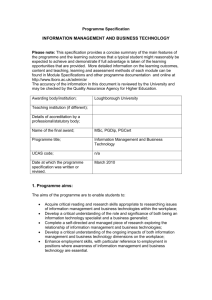
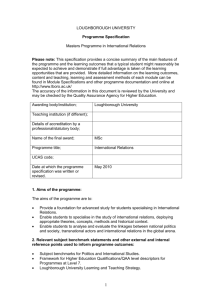
![BA [Hons] Politics with a Minor subject](http://s3.studylib.net/store/data/007354735_1-e679441f23ad7d440164ba73a2b88732-300x300.png)
